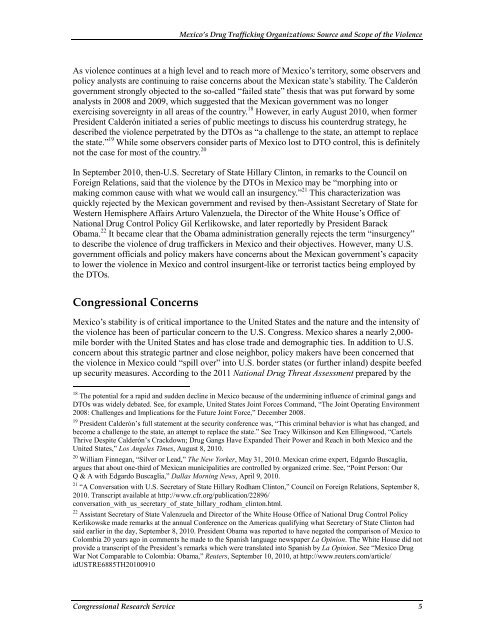Mexico's Drug Trafficking Organizations - Federation of American ...
Mexico's Drug Trafficking Organizations - Federation of American ...
Mexico's Drug Trafficking Organizations - Federation of American ...
Create successful ePaper yourself
Turn your PDF publications into a flip-book with our unique Google optimized e-Paper software.
Mexico’s <strong>Drug</strong> <strong>Trafficking</strong> <strong>Organizations</strong>: Source and Scope <strong>of</strong> the Violence<br />
As violence continues at a high level and to reach more <strong>of</strong> Mexico’s territory, some observers and<br />
policy analysts are continuing to raise concerns about the Mexican state’s stability. The Calderón<br />
government strongly objected to the so-called “failed state” thesis that was put forward by some<br />
analysts in 2008 and 2009, which suggested that the Mexican government was no longer<br />
exercising sovereignty in all areas <strong>of</strong> the country. 18 However, in early August 2010, when former<br />
President Calderón initiated a series <strong>of</strong> public meetings to discuss his counterdrug strategy, he<br />
described the violence perpetrated by the DTOs as “a challenge to the state, an attempt to replace<br />
the state.” 19 While some observers consider parts <strong>of</strong> Mexico lost to DTO control, this is definitely<br />
not the case for most <strong>of</strong> the country. 20<br />
In September 2010, then-U.S. Secretary <strong>of</strong> State Hillary Clinton, in remarks to the Council on<br />
Foreign Relations, said that the violence by the DTOs in Mexico may be “morphing into or<br />
making common cause with what we would call an insurgency.” 21 This characterization was<br />
quickly rejected by the Mexican government and revised by then-Assistant Secretary <strong>of</strong> State for<br />
Western Hemisphere Affairs Arturo Valenzuela, the Director <strong>of</strong> the White House’s Office <strong>of</strong><br />
National <strong>Drug</strong> Control Policy Gil Kerlikowske, and later reportedly by President Barack<br />
Obama. 22 It became clear that the Obama administration generally rejects the term “insurgency”<br />
to describe the violence <strong>of</strong> drug traffickers in Mexico and their objectives. However, many U.S.<br />
government <strong>of</strong>ficials and policy makers have concerns about the Mexican government’s capacity<br />
to lower the violence in Mexico and control insurgent-like or terrorist tactics being employed by<br />
the DTOs.<br />
Congressional Concerns<br />
Mexico’s stability is <strong>of</strong> critical importance to the United States and the nature and the intensity <strong>of</strong><br />
the violence has been <strong>of</strong> particular concern to the U.S. Congress. Mexico shares a nearly 2,000-<br />
mile border with the United States and has close trade and demographic ties. In addition to U.S.<br />
concern about this strategic partner and close neighbor, policy makers have been concerned that<br />
the violence in Mexico could “spill over” into U.S. border states (or further inland) despite beefed<br />
up security measures. According to the 2011 National <strong>Drug</strong> Threat Assessment prepared by the<br />
18 The potential for a rapid and sudden decline in Mexico because <strong>of</strong> the undermining influence <strong>of</strong> criminal gangs and<br />
DTOs was widely debated. See, for example, United States Joint Forces Command, “The Joint Operating Environment<br />
2008: Challenges and Implications for the Future Joint Force,” December 2008.<br />
19 President Calderón’s full statement at the security conference was, “This criminal behavior is what has changed, and<br />
become a challenge to the state, an attempt to replace the state.” See Tracy Wilkinson and Ken Ellingwood, “Cartels<br />
Thrive Despite Calderón’s Crackdown; <strong>Drug</strong> Gangs Have Expanded Their Power and Reach in both Mexico and the<br />
United States,” Los Angeles Times, August 8, 2010.<br />
20 William Finnegan, “Silver or Lead,” The New Yorker, May 31, 2010. Mexican crime expert, Edgardo Buscaglia,<br />
argues that about one-third <strong>of</strong> Mexican municipalities are controlled by organized crime. See, “Point Person: Our<br />
Q & A with Edgardo Buscaglia,” Dallas Morning News, April 9, 2010.<br />
21 “A Conversation with U.S. Secretary <strong>of</strong> State Hillary Rodham Clinton,” Council on Foreign Relations, September 8,<br />
2010. Transcript available at http://www.cfr.org/publication/22896/<br />
conversation_with_us_secretary_<strong>of</strong>_state_hillary_rodham_clinton.html.<br />
22 Assistant Secretary <strong>of</strong> State Valenzuela and Director <strong>of</strong> the White House Office <strong>of</strong> National <strong>Drug</strong> Control Policy<br />
Kerlikowske made remarks at the annual Conference on the Americas qualifying what Secretary <strong>of</strong> State Clinton had<br />
said earlier in the day, September 8, 2010. President Obama was reported to have negated the comparison <strong>of</strong> Mexico to<br />
Colombia 20 years ago in comments he made to the Spanish language newspaper La Opinion. The White House did not<br />
provide a transcript <strong>of</strong> the President’s remarks which were translated into Spanish by La Opinion. See “Mexico <strong>Drug</strong><br />
War Not Comparable to Colombia: Obama,” Reuters, September 10, 2010, at http://www.reuters.com/article/<br />
idUSTRE6885TH20100910<br />
Congressional Research Service 5















